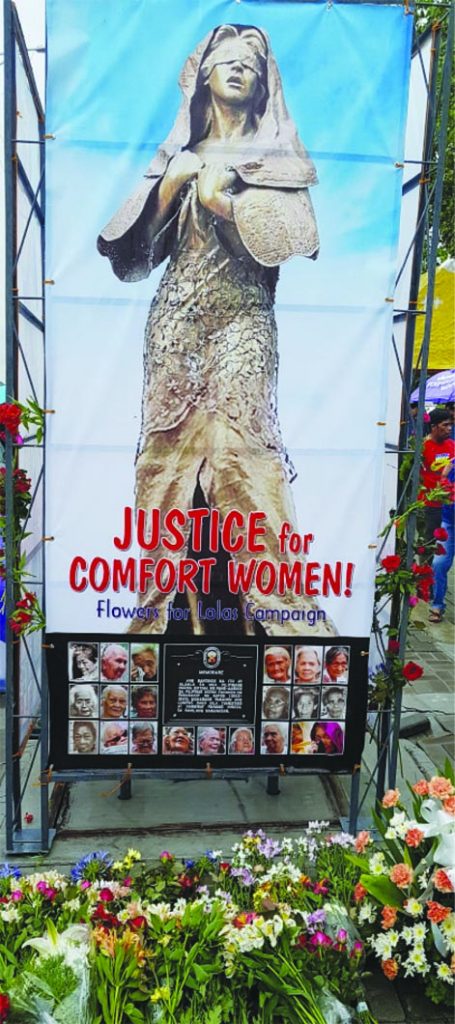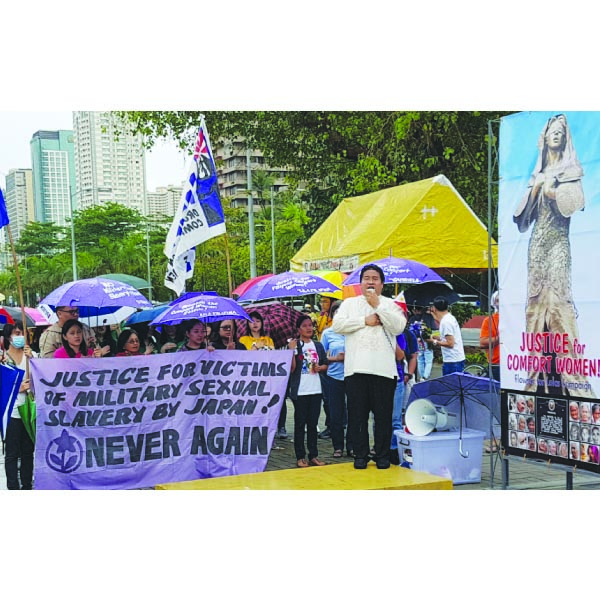 “W ill there be war again?”
“W ill there be war again?”
This was the question Lola Estellita Dy asked when told US troops were in the country for war exercises. This was in May, when the 2018 PH-US Balikatan exercises were being held in Central Luzon.
“War is difficult… women and children…the innocents… they suffer most,” she said, teary-eyed.
She had also heard on the radio that the Manila city government had the statue of the comfort woman removed.
“Why?” There was a mix of sadness and indignation in her voice. “We put up that statue because we wanted the world to know that there were also ‘comfort women’ here.”
Lola Estellita is one of few surviving Filipinos euphemistically called “Comfort Women.” More than a hundred elderly women came out publicly in the early 1990s with their stories of sexual slavery by troops of the Japanese Imperial Army during World War II.
“I was hesitant at first…but hearing Lola Rosa speak on TV, I just knew I had to come out, too,” Lola Estellita reminisced.
At 88 years old, she is a bit hard of hearing, but that doesn’t stop her from carrying on the fight for justice “…so the young will know…so that it will never happen again.”
Lola Estellita recently joined Representatives Arlene Brosas and Emmi de Jesus of the GABRIELA Women’s Party list and members of the #FlowersforLolas campaign in filing a House Resolution calling for an investigation of the removal of the comfort woman statue.
It was an issue that shocked many because the Philippines is the only country to succumb to pressures from the Japanese government to remove markers of Japanese WWII atrocities.
The removal was done in haste and secrecy, and in spite of concerns raised by several groups. It came on the heels of Japan Minister for Internal Affairs and Communications Seiko Noda’s expressions of “regrets” over the construction of the monument in January.
Japan is one of the biggest foreign creditors for the Philippine government’s “Build-Build-Build” Program that reportedly includes Southeast Asia’s “Project of the Century,” the 25-kilometer-long subway from the north of Metro Manila to the Ninoy Aquino International Airport.
The project will be funded by a $7 billion loan payable in 40 years. In 2017 alone, the Philippine government secured $1.26 billion (P65 billion) in commitments from Japan mainly for infrastructure projects.
It is not far-fetched to say that the removal of the statue was done by the Philippine government in exchange for billions of Japanese aid for the national government’s flagship projects.
The comfort women story became a momentous concern nearly 30 years ago, when the Lolas came out with their stories. Unfortunately, the current generation knows very little about the issue.
This is in large part due to past and present governments repeatedly brushing off demands by the comfort women and their supporters to include in school curricula the atrocities of military sexual slavery of Filipino women during World War II.
Raising public awareness and support becomes, once more, an arduous process that gets little government support. The statue’s removal can be seen as an attempt to revise Philippine history, something which is not, and should never be, acceptable to Filipinos who uphold the universally-accepted principles of truth and social justice.
The 30 years of campaigning for justice for Filipino comfort women is a story written in tears. Many of the stories are too harrowing. The efforts to document and verify the stories were largely private efforts funded and supported by individuals and organizations.
Some of the women have chosen to share their stories but only in private, fearing the shame and stigma of having been sexually abused in their early years. Most of the Lolas have passed away without seeing the fruits of their struggle.
It has been 30 years, and in spite of the international outcry, the Japanese government has yet to acknowledge its past atrocity. It has yet to issue a formal, public apology for the war crimes committed against the Filipino comfort women.
For Lila Pilipina, wars of occupation, militarism and the sexual slavery of women go hand in hand. The Philippine bears witness as to how women suffer as one foreign power after another – from the Spaniards, to the Japanese, and later the Americans – colonized the country, and heaped various forms of abuse against women.
First were the friar abuses against Filipinas during the Spanish colonial period, then massive cases of rape and mutilation of women during the Japanese occupation, and in more recent times, the proliferation of the sex trade and abuses by US servicemen.
The flesh industry in this country thrived wherever US bases were located, and young women are fodder for “rest and recreation” activities of soldiers from warships docked on the country’s shores. Many fell victim to horrible abuse and gruesome crimes at the hands of US servicemen.
While the Comfort Women’s search for justice remain its central theme, the organization has also, on many instances, stood up against the sexual enslavement of women wherever wars of occupation or foreign aggression happens.
#FlowersforLolas
As a result of the removal of the comfort woman statue, several groups have banded together to campaign for the reinstatement of the statue and to support the continuing fight for justice of the Filipino comfort women.
Some organizations count among their members descendants of World War II fighters and victims. Some groups are engaged in the study and preservation of Philippine history.
Still others are students moved by the stories of the Lolas and who now volunteer their time and talent to help organize information and awareness-raising campaigns among the youth, as well as campaigns supporting the various needs of the Lolas.
Lola Estellita can still vividly recall shared moments with her peers, many of whom has since died. She goes on enumerating the names of others who have gone on before her. “…I do not know what will happen to our cause…there are very few of us left, and I myself am no longer that strong…but I guess I will have to keep on fighting.”
Fighting words from someone who is in her twilight years, but whose recollection of the war and the vivid memories of suffering and dehumanization it brought, will serve as a beacon for the current and future generations, to help them realize their patriotic duty to oppose foreign occupation and ensure that such brutalities against women will never happen again. — The author was involved in the comfort women campaign in the early 90’s and is currently acting executive director for Lila Pilipina, the organization of Filipino Comfort Women. She is also a long-time member of GABRIELA Women’s Alliance and a freelance writer.
